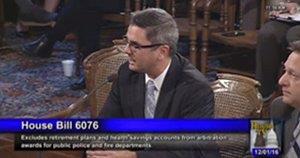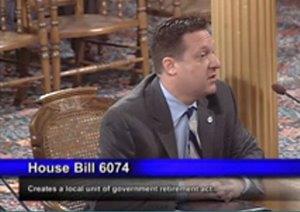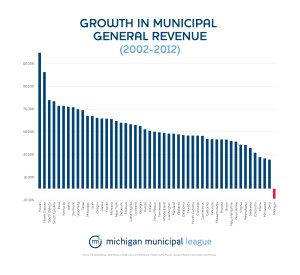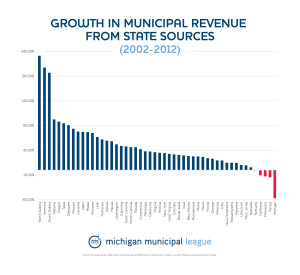
The League’s Anthony Minghine (left) and Chris Hackbarth (right) testify on the OPEB reform effort Thursday in the state House Committee on Local Government.
The bills, House Bills 6074-6086 went before the House Local Government committee today – Thursday (Dec. 1, 2016) at 10:30 a.m.
League staff were given an opportunity to testify on the bills this morning and supported the concept of what the bills aim to do. League staff were briefed on this proposal just prior to the bill introduction and it may move through the process during lame duck.
Governor Snyder’s administration, while preferring to deal with this issue next year as part of a comprehensive conversation, recognizes that this is a major issue and is likely to support it. View a Detroit Free Press article about the hearing here.
During the hearing, the League’s Chris Hackbarth and Anthony Minghine were given an opportunity to testify. The hearing recessed Thursday with no vote cast and resumed later in the afternoon and Hackbarth and Minghine were able to finish testifying. The Michigan Association of Counties and Michigan Townships Association also testified in the afternoon in support of the OPEB reform effort in concept. At the end of Thursday’s hearing, the committee chair, Lee Chatfield, R-Levering, urged people to read the package of bills over the weekend. Chatfield indicated the committee would likely continue the discussion on the issue next week.
“This is a great first step and we look forward to continuing the discussion,” said Hackbarth, director of state affairs for the League. “We support giving additional tools to our communities. (These bills) will allow additional local control.”
Minghine, the League’s COO and associate executive director, added: “We need a model that is sustainable. At first blush we are encouraged by where this package goes.”
The League has expressed concerns about dealing with this in such a short window, and expect that if this proposal is adopted there may be a need for follow-up legislation in the next session to address any issues that arise.
In summary:

The League’s Chris Hackbarth testifies on the OPEB reform package of bills discussed in a state House committee Thursday.
- The proposal consists of 13 bills, solely focused on retiree health care. There is no proposal to address municipal pension systems.
- 4 main bills and 9 trailer bills that will simply refer back to the changes made in the initial 4 bills
- 4 main bills will provide for a new act that specifies allowable retiree health benefits, a transparency/reporting bill, a PERA bill, and an amendment to PA 312 binding arbitration
- PERA amendment would state that retiree health benefit offerings are a prohibited subject of bargaining.
- PA 312 amendment would prohibit an arbitrator from issuing an order that includes retiree health benefits.
- There is a trigger mechanism in the proposal so that it would only impact municipalities with a GASB-defined actuarially funded level for OPEB below 80%. No requirement for pre-funding for any community, regardless of current unfunded liability.
- Package would address retiree health offering according to the type of employee
- New hires after effective date could only be offered an employer contribution of a maximum of 2% of compensation towards a retirement health savings account. This offering is at the employers discretion.
- Existing employees who do not retire before expiration of current contract would be subject to a minimum cost share of 20% of their retirement health benefit. The specific cost share would be set by the city. Extensions or renewals of existing contracts could not include retiree health benefit offerings outside of the 80/20 cost share.
- For existing retirees, this same 80/20 cost share would be in effect, to the extent that the agreement they retired under does not offer a “vested” right to that benefit. This is a concept that is based in current case law and would allow changes to some, but not all retirees.
- Once a retiree qualifies for Medicare, the municipality could only offer to cover a Medicare supplemental insurance product at the same 80/20 cost share level.
- Retirees would be ineligible to receive health insurance coverage from the municipality if health insurance coverage is available from another employer subsequent to their retirement from the municipality.
- Based upon the remaining session schedule, a bill introduction on 11/30/16 would require committee action immediately following introduction with floor action in the House not eligible until 12/6/16 at the earliest. If the House moves the bills during the session week of 12/6-12/8, the bills would not be eligible to move in the Senate until the following week…12/13-12/15.
- The bill package would have an effective date starting May 1 of 2017.
The League’s Board of Trustees was briefed on this proposal and while we continue to review the legislation the issue of OPEB reform has been a central component of the League’s municipal finance initiative and we testified in committee today in support of the concept of such reform.
Chris Hackbarth is the League’s director of state affairs. He can be reached at 517-908-0304 and chackbarth@mml.org.





